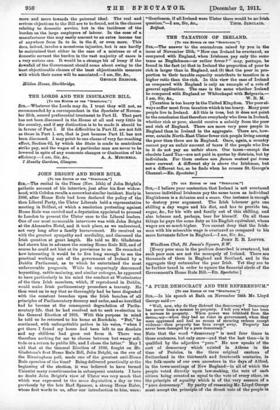THE TAXATION OF IRELAND.
[To THE EDITOR OF THE "SPECTATOR."]
SIR,—The answer to the conundrum raised by you in the issue of November 25th, " How can Ireland be overtaxed, as compared with England, when Irishmen pay only the same taxes as Englishmen—or rather fewer ? " may, perhaps, be found in the fact (a) that in Ireland the proportion of poor to rich is larger than in England, and (b) that the poor in pro- portion to their taxable capacity contribute to taxation in a higher ratio than the rich. In this view the case of Ireland as compared with England is only an example of a rule of general application. The case is the same whether Ireland be compared with England or Whitechapel with Belgravia.— [Taxation is too heavy in the United Kingdom. The poor al- ways suffer most from taxation which is too heavy. Many poor people live in Ireland. All this is true, but it does not point to the conclusion that therefore everybody who lives in Ireland, whether rich or poor, should receive a subsidy from the poor and rich of England. There are more very poor people in England than in Ireland in the aggregate. There are, how- ever, outside North-East Ulster fewer rich people living among the poor than there are in England. Once, again, a country cannot pay an unfair amount of taxes if the people who live in it do not pay an unfair share. Our taxes—except the obsolete Land Tax—are not paid in quotas by districts, but by individuals. For them caelnnr non ftscum mutant qui trans mare cut-runt. A different sky is above the Irishman, but not a different tax, as he finds when he crosses St. George's Channel.—En. Spectator.]


































































 Previous page
Previous page